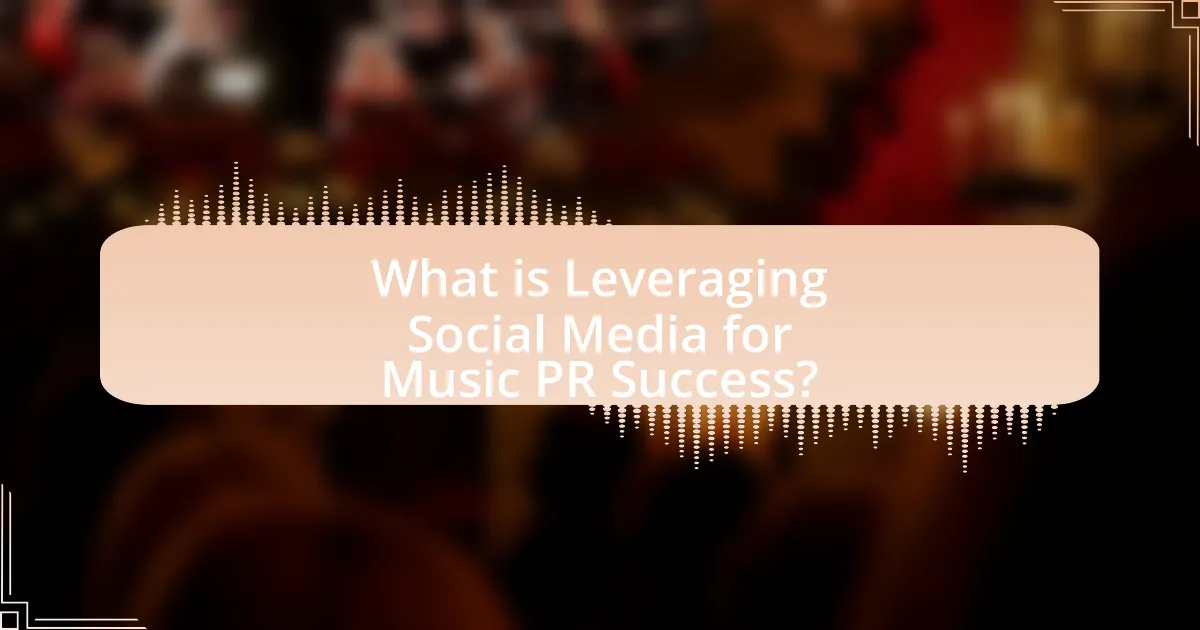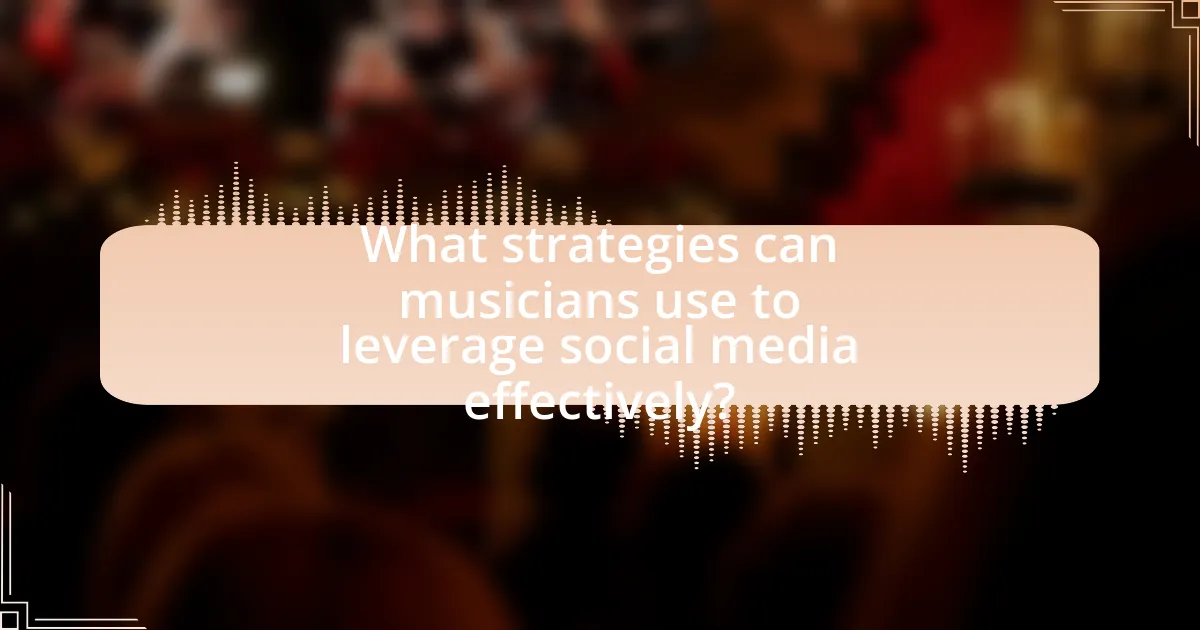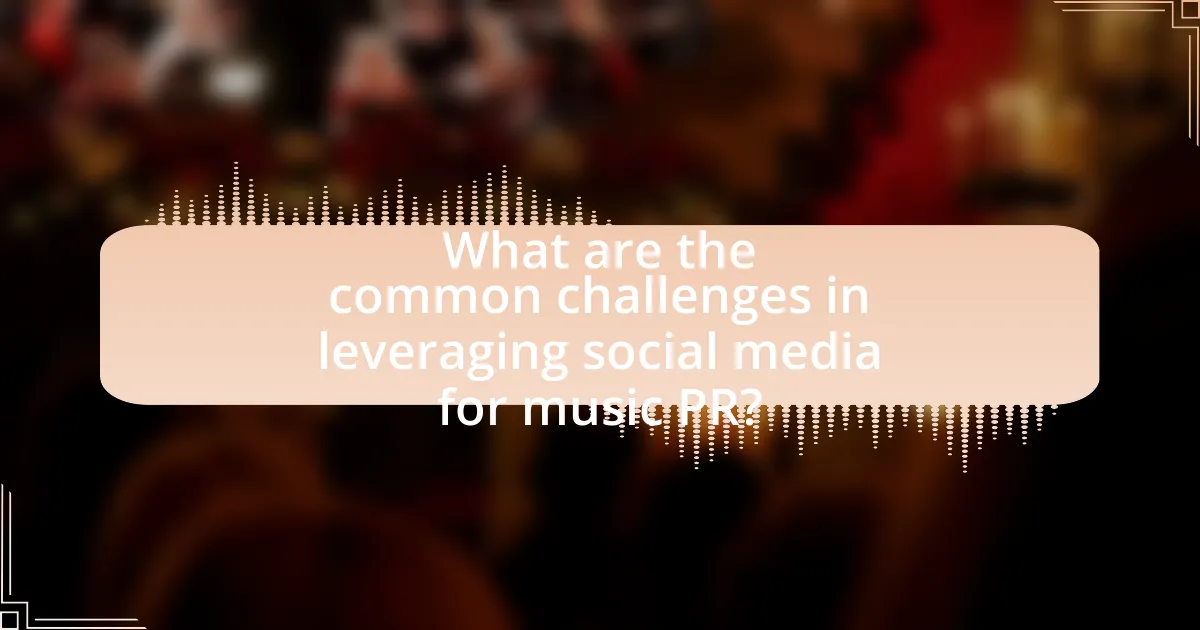Leveraging social media for music public relations (PR) success is essential for enhancing artist visibility and fan engagement. The article outlines the significant impact of platforms like Instagram, Twitter, and TikTok on music promotion, highlighting how these channels facilitate direct interaction with audiences and allow for tailored marketing strategies. Key social media platforms are identified, along with their unique advantages for different music genres. The article also discusses effective content creation, the role of influencers, and best practices for maintaining a consistent online presence, while addressing common challenges musicians face in the digital landscape.

What is Leveraging Social Media for Music PR Success?
Leveraging social media for music PR success involves utilizing platforms like Instagram, Twitter, and Facebook to enhance an artist’s visibility and engagement with fans. Social media allows musicians to share content, interact directly with their audience, and promote new releases or events, which can lead to increased fan loyalty and broader reach. According to a 2021 report by the International Federation of the Phonographic Industry, 75% of music consumers discover new music through social media, highlighting its critical role in modern music promotion.
How does social media impact music public relations?
Social media significantly impacts music public relations by enabling artists and labels to engage directly with their audience, fostering real-time communication and feedback. This direct interaction allows for the rapid dissemination of news, updates, and promotional content, which can enhance visibility and audience connection. For instance, a study by the Pew Research Center found that 72% of the public uses social media, making it a crucial platform for reaching potential fans. Additionally, social media analytics provide valuable insights into audience preferences and behaviors, allowing music public relations strategies to be tailored effectively.
What are the key social media platforms for music PR?
The key social media platforms for music PR are Instagram, Facebook, Twitter, TikTok, and YouTube. Instagram is essential for visual storytelling and engaging with fans through posts and stories, while Facebook offers extensive reach and event promotion capabilities. Twitter facilitates real-time interaction and updates, making it ideal for announcements and fan engagement. TikTok has rapidly become a powerful platform for viral music promotion, leveraging short-form video content to reach younger audiences. YouTube serves as the primary platform for music videos and long-form content, allowing artists to showcase their work and connect with fans. These platforms collectively enhance visibility and engagement for music PR efforts.
How do different platforms cater to various music genres?
Different platforms cater to various music genres by tailoring their features, algorithms, and user engagement strategies to meet the preferences of specific audiences. For instance, Spotify utilizes personalized playlists and genre-specific charts to promote diverse music styles, while SoundCloud focuses on independent artists and niche genres, allowing for a more grassroots approach to music discovery. Additionally, YouTube’s vast video content supports genres that benefit from visual storytelling, such as pop and hip-hop, enhancing audience connection through music videos and live performances. These strategies are supported by user data and engagement metrics, demonstrating how platforms adapt to genre-specific demands and listener behaviors.
Why is social media essential for music promotion?
Social media is essential for music promotion because it provides artists with direct access to a global audience, enabling them to share their music and engage with fans instantly. Platforms like Instagram, Facebook, and TikTok allow musicians to showcase their work, build a brand, and create a community around their music. According to a 2021 report by the International Federation of the Phonographic Industry, 70% of music consumers discover new music through social media, highlighting its critical role in reaching potential listeners. Additionally, social media facilitates targeted advertising, allowing artists to promote their music to specific demographics, further enhancing their promotional efforts.
What advantages does social media offer over traditional PR methods?
Social media offers several advantages over traditional PR methods, primarily through its ability to reach a larger audience quickly and interactively. Unlike traditional PR, which often relies on press releases and media coverage, social media platforms enable direct engagement with fans and stakeholders, fostering real-time communication. For instance, a study by the Pew Research Center indicates that 72% of the public uses social media, providing a vast potential audience for music promotion. Additionally, social media allows for targeted advertising, enabling music brands to reach specific demographics based on user data, which is less feasible with traditional PR methods. This targeted approach can lead to higher engagement rates and more effective marketing campaigns.
How does social media enhance audience engagement for musicians?
Social media enhances audience engagement for musicians by providing direct communication channels that foster interaction and community building. Platforms like Instagram, Twitter, and TikTok allow musicians to share content, respond to fan inquiries, and create a sense of belonging among their audience. For instance, a study by the Pew Research Center found that 72% of adults use social media, which musicians can leverage to reach a broad audience and engage with fans in real-time. This engagement is further amplified through features like live streaming, polls, and user-generated content, which encourage fans to participate actively in the musician’s journey.

What strategies can musicians use to leverage social media effectively?
Musicians can leverage social media effectively by creating engaging content, interacting with their audience, and utilizing analytics to refine their strategies. Engaging content includes high-quality videos, behind-the-scenes footage, and live performances, which can increase audience retention and sharing. Interaction with fans through comments, direct messages, and live Q&A sessions fosters a sense of community and loyalty. Additionally, using analytics tools provided by platforms like Instagram and Facebook allows musicians to track engagement metrics, helping them understand what content resonates most with their audience. According to a study by the Pew Research Center, 72% of adults use social media, indicating a vast potential audience for musicians to reach and engage with.
How can musicians create compelling content for social media?
Musicians can create compelling content for social media by showcasing their unique personality and artistry through engaging visuals, behind-the-scenes footage, and interactive posts. This approach allows musicians to connect authentically with their audience, fostering a sense of community and loyalty. Research indicates that posts featuring personal stories or behind-the-scenes content receive 50% more engagement than standard promotional posts, highlighting the effectiveness of this strategy. Additionally, utilizing platforms like Instagram and TikTok, which prioritize visual and short-form content, can amplify reach and engagement, as these platforms have over 1 billion and 1.5 billion monthly active users, respectively.
What types of content resonate most with music audiences?
Music audiences resonate most with authentic and engaging content, such as behind-the-scenes footage, live performances, and personal stories from artists. These types of content foster a deeper connection between the artist and the audience, enhancing emotional engagement. For instance, a study by Nielsen Music found that 70% of fans feel more connected to artists who share personal insights and experiences, indicating that authenticity is key in content that resonates. Additionally, interactive content like polls and Q&A sessions on social media platforms further increases audience engagement, as they encourage participation and create a sense of community among fans.
How can storytelling enhance a musician’s social media presence?
Storytelling can enhance a musician’s social media presence by creating a deeper emotional connection with their audience. When musicians share personal stories, experiences, or the inspiration behind their music, they engage followers on a more relatable level, fostering loyalty and community. Research indicates that posts with storytelling elements receive 300% more engagement than standard promotional content, highlighting the effectiveness of narrative in capturing attention and encouraging interaction. This approach not only humanizes the artist but also encourages fans to share their stories, amplifying the musician’s reach and visibility across social platforms.
What role do influencers play in music PR on social media?
Influencers play a crucial role in music PR on social media by amplifying an artist’s reach and engagement with target audiences. They leverage their established follower base to promote music releases, concerts, and brand partnerships, effectively acting as trusted intermediaries between artists and fans. For instance, a study by the Digital Marketing Institute found that 49% of consumers depend on influencer recommendations when making purchasing decisions, highlighting the significant impact influencers have on audience behavior. This dynamic not only enhances visibility for artists but also fosters a sense of authenticity and connection, as fans often perceive influencers as relatable figures.
How can musicians identify the right influencers for their brand?
Musicians can identify the right influencers for their brand by analyzing the influencer’s audience demographics, engagement rates, and content relevance. By using tools like social media analytics and influencer marketing platforms, musicians can assess whether an influencer’s followers align with their target audience, ensuring effective outreach. For instance, a study by Influencer Marketing Hub found that 63% of marketers believe that identifying the right influencers is crucial for campaign success, highlighting the importance of this alignment. Additionally, examining the influencer’s previous collaborations and the authenticity of their engagement can provide insights into their suitability for promoting a musician’s brand.
What are the best practices for collaborating with influencers?
The best practices for collaborating with influencers include selecting the right influencers, establishing clear communication, and setting measurable goals. Choosing influencers whose audience aligns with your target demographic ensures authenticity and relevance, which can enhance engagement. Clear communication about expectations, deliverables, and timelines fosters a productive partnership. Additionally, setting measurable goals, such as engagement rates or conversion metrics, allows for evaluating the success of the collaboration. According to a study by Influencer Marketing Hub, 63% of marketers believe that influencer marketing is effective, highlighting the importance of strategic collaboration in achieving marketing objectives.

What are the common challenges in leveraging social media for music PR?
Common challenges in leveraging social media for music PR include oversaturation of content, difficulty in audience engagement, and algorithm changes on platforms. The music industry faces intense competition, with thousands of artists vying for attention, making it hard for individual musicians to stand out. Additionally, engaging audiences effectively requires consistent interaction and creative content, which can be resource-intensive. Furthermore, social media algorithms frequently change, impacting the visibility of posts and making it challenging for artists to maintain a consistent reach. These factors collectively hinder the effectiveness of social media as a tool for music public relations.
What pitfalls should musicians avoid when using social media?
Musicians should avoid oversharing personal information on social media, as it can lead to privacy issues and damage their professional image. Maintaining a clear boundary between personal and professional content is crucial; for instance, sharing too much about personal struggles can alienate fans or create negative perceptions. Additionally, musicians should refrain from engaging in online conflicts or controversies, as this can distract from their music and tarnish their reputation. Studies show that negative interactions can lead to a decrease in follower engagement, which is vital for maintaining a successful online presence. Lastly, musicians must avoid inconsistent posting, as irregular activity can result in losing audience interest and engagement, ultimately affecting their promotional efforts.
How can negative feedback be managed on social media platforms?
Negative feedback on social media platforms can be managed by promptly addressing concerns, engaging with users, and providing transparent communication. Research indicates that 70% of consumers expect brands to respond to their complaints on social media within an hour, highlighting the importance of timely responses. Engaging directly with users can help de-escalate negative situations, as studies show that personalized responses can improve customer satisfaction by up to 33%. Additionally, maintaining a consistent brand voice and showing empathy can foster a positive community atmosphere, which is crucial for music PR success.
What strategies can mitigate the risk of social media burnout?
To mitigate the risk of social media burnout, individuals should implement strategies such as setting time limits for social media use, curating content to follow only relevant accounts, and scheduling regular breaks from platforms. Research indicates that excessive social media use can lead to increased stress and anxiety, with a study published in the Journal of Social and Clinical Psychology showing that limiting social media to 30 minutes a day significantly reduces feelings of loneliness and depression. By actively managing their social media engagement, users can maintain a healthier relationship with these platforms, ultimately enhancing their overall well-being and productivity in music PR efforts.
How can musicians measure the success of their social media efforts?
Musicians can measure the success of their social media efforts by analyzing key performance indicators (KPIs) such as engagement rates, follower growth, and conversion metrics. Engagement rates, which include likes, shares, and comments, indicate how well content resonates with the audience; for instance, a 2% engagement rate is considered average across platforms. Follower growth reflects the expanding reach of the musician’s brand, with a consistent increase suggesting effective outreach strategies. Conversion metrics, such as the number of streams, downloads, or ticket sales generated from social media campaigns, provide concrete evidence of the impact on the musician’s career. According to a study by Hootsuite, 73% of marketers believe that social media marketing has been “somewhat effective” or “very effective” for their business, underscoring the importance of these metrics in evaluating success.
What metrics are most important for evaluating music PR campaigns?
The most important metrics for evaluating music PR campaigns include media coverage, social media engagement, audience reach, and conversion rates. Media coverage quantifies the number of articles, reviews, and features generated, indicating the campaign’s visibility. Social media engagement measures likes, shares, comments, and overall interaction, reflecting audience interest and connection. Audience reach assesses the total number of individuals exposed to the campaign, which is crucial for understanding its impact. Conversion rates track actions taken by the audience, such as streaming, downloads, or ticket purchases, providing insight into the campaign’s effectiveness in driving desired outcomes. These metrics collectively offer a comprehensive view of a music PR campaign’s success and areas for improvement.
How can data analytics inform future social media strategies?
Data analytics can inform future social media strategies by providing insights into audience behavior, engagement patterns, and content performance. By analyzing metrics such as likes, shares, comments, and click-through rates, organizations can identify which types of content resonate most with their target audience. For instance, a study by Sprout Social found that posts with images receive 650% higher engagement than text-only posts, highlighting the importance of visual content in social media strategies. Additionally, data analytics can help in segmenting audiences based on demographics and interests, allowing for more tailored and effective marketing campaigns. This targeted approach can lead to increased brand loyalty and higher conversion rates, as evidenced by a report from HubSpot, which states that personalized marketing can improve engagement by up to 74%.
What are the best practices for ongoing social media engagement?
The best practices for ongoing social media engagement include consistently posting high-quality content, actively responding to audience interactions, and utilizing analytics to refine strategies. Consistent posting keeps the audience engaged and informed, while high-quality content fosters a positive brand image and encourages sharing. Actively responding to comments and messages builds community and loyalty, as 53% of consumers expect brands to respond to their inquiries within an hour. Utilizing analytics helps identify what content resonates most with the audience, allowing for data-driven adjustments to enhance engagement.
How can musicians maintain a consistent online presence?
Musicians can maintain a consistent online presence by regularly posting engaging content across various social media platforms. This includes sharing updates about new music, behind-the-scenes footage, and personal stories that resonate with their audience. Research indicates that brands that post consistently see a 67% increase in engagement, highlighting the importance of frequency in content sharing. Additionally, utilizing scheduling tools can help musicians plan and automate their posts, ensuring a steady stream of content without overwhelming their audience. Engaging with followers through comments and messages further strengthens their online community, fostering loyalty and connection.
What tips can enhance interaction with fans on social media?
To enhance interaction with fans on social media, consistently engage with them through timely responses and personalized content. Engaging directly with fans by replying to comments and messages fosters a sense of community and loyalty. According to a study by Sprout Social, 70% of consumers feel more connected to brands when their social media interactions are personalized. Additionally, utilizing interactive content such as polls, Q&A sessions, and live streams encourages active participation and strengthens the relationship between artists and their audience.